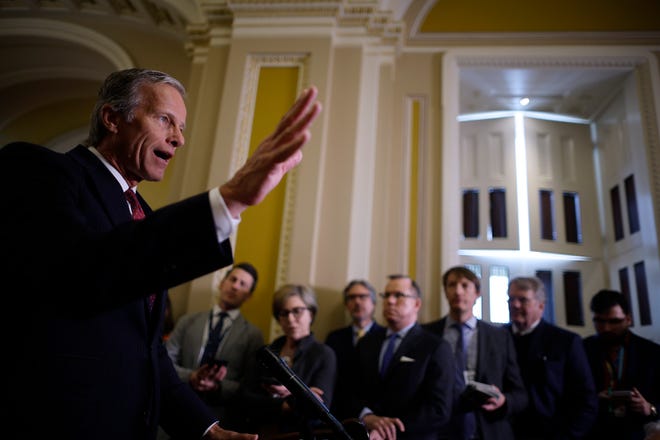
In the latest in a series of efforts by Republicans to stop what they call “woke” investment decisions, the House voted Tuesday to block a Biden administration rule that allows retirement plans to consider environmental, social and corporate governance principles.
The Labor Department rule enacted late last year makes it easier for retirement plans to take into account climate change and other ESG factors when they choose investments. ESG is the acronym for environmental, social and corporate governance principles.
“Congress must act to block the Biden administration’s recent rule that green lights so-called ESG investing in millions of Americans’ retirement plans,” Kentucky GOP Rep. Andy Barr, who introduced the bill, said during the debate on the House floor Tuesday.
Dictionary.com adds woke:Also, here’s what deadass, hellscape and petfluencer mean
Is ChatGPT ‘woke’?:AI chatbot accused of anti-conservative bias and a grudge against Trump
The measure passed 216-204. One Democrat joined with Republicans. The House measure could have enough support in the Senate to send it to President Biden’s desk but the White House has said it would veto it.
“The rule reflects what successful marketplace investors already know – there is an extensive body of evidence that environmental, social and governance factors can have material impacts on certain markets, industries and companies,” the White House said in a statement.
What is the main purpose of ESG?
ESG is an investing strategy that takes into account factors in addition to financial analysis.
Money managers like BlackRock, Vanguard and State Street, which collectively manage $22 trillion in assets, are signatories of the United Nations Principles for Responsible Investing.
While not widely known outside investment circles, ESG is fast becoming a popular GOP talking point in the run-up to the 2024 presidential election.
Is ESG ‘woke’?
Republican lawmakers across the country accuse BlackRock and other asset managers of using their influence to push liberal policies and put pressure on companies to reduce emissions or hire more diverse boards of directors.
Red states from Texas to West Virginia have pulled billions from BlackRock and other money managers despite concerns that doing so may hurt financially.

“As worthy as those goals may be, they are not goals that may be entirely motivated by value maximization and they do not align with the views of many Americans who invest with those asset managers,” said Vivek Ramaswamy, the co-founder of investment firm Strive Asset Management who recently announced his bid for the 2024 GOP presidential nomination.
Big money managers disagree. “We have one bias,” BlackRock Senior Managing Director Dalia Blass said at a hearing held in December before the Texas Senate’s Committee on State Affairs, “and that’s to get the best risk-adjusted returns for our clients.”
What are examples of ESG?
This latest front in the culture wars is intensifying in part because ESG is seen as a threat to the oil, gas and coal industries.
Corporate environmental efforts often include reducing carbon footprints and divesting from fossil fuels. Investors now consider these efforts when deciding which companies to invest in and that trend is gaining momentum.
DeSantis leads fight against ESG
A leader in the anti-ESG movement is Florida Gov. Ron DeSantis, a likely 2024 GOP presidential contender.
“ESG provides a pretext for CEOs to use shareholder assets to target issues like reducing the use of fossil fuels and restricting Second Amendment rights. It is, in effect, a way for the political left to achieve through corporate power what they cannot achieve at the ballot box,” DeSantis wrote in his new book, “The Courage to be Free: Florida’s Blueprint for American Revival.”






